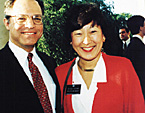|
GOLDSEA |
ASIAMS.NET |
ASIAN AMERICAN WONDER WOMEN
POWER PIONEER
PAGE 3 OF 4
"My grandparents came over here with nothing," Gramm explains.
"They weren't naturally brilliant or talented. They were ordinary people, but
here they could do what they wanted. My family is very average, but my
father ended up going to college during the depression and ended up holding
this position of authority. That's what America is all about, and that's what
free markets are all about.
"With over-regulation, and with the government telling you how to run
your business and other stupid things, America would not have had the
economy that allowed my grandparents to come over and work."
 endy Lee was born in 1945, the third of four siblings. In high school she
excelled in math and planned to major in it when she attended Wellesley
College in Massachusetts. But she found college math bland, switched to
economics and was intrigued by market and business dynamics.
endy Lee was born in 1945, the third of four siblings. In high school she
excelled in math and planned to major in it when she attended Wellesley
College in Massachusetts. But she found college math bland, switched to
economics and was intrigued by market and business dynamics.
After graduating she entered Northwestern University's doctoral
program. Her dissertation, written in 1970, examined the influence of
married women in the labor force and discovered that their participation
depended directly on the ages of their children. This was ground-breaking
research.
Wendy Lee was attracted to the study of economics more than its practice,
and after receiving her doctorate she looked for a university teaching
position. The search led to the American Economics Association conference,
where she found a job and met Phil Gramm.
[CONTINUED BELOW]
At the conference, a Texas A&M rep interviewed and hired Wendy as an
associate economics professor. Phil Gramm, then a young economics
professor at the university, "began checking me out" after the interview,
Gramm recalls. Two years later, they were married.
The Gramms taught, conducted research and bore two kids during a six
year stint at Texas A&M. In 1978 Phil entered politics. He won a seat in the
House of Representatives, and the Gramms left for Washington, D.C.
Gramm could have drifted into the social circle of Congressional wives.
Instead, she was determined to pursue her career. She maintained contact
with her Texas A&M peers and landed a job at the Institute for Defense
Analysis, a Washington-based think tank where she spent three years
researching Cold War issues.
During this time, an old Texas A&M colleague came to Washington to
head the Federal Trade Commission, one of the largest regulatory agencies.
He repeatedly asked Gramm to work for him. Gramm turned him down.
"I told him I didn't want to work for the government," Gramm recalls.
"And my husband would joke, 'I'm a Congressman. I don't want to be
married to a bureaucrat.' But he kept prodding. Finally after six months I
said to myself, 'Well, instead of always complaining about the government,
I'm going to do my part and see if I can be part of the solution to all its
problems.'"
She worked as an economist with the FTC. She quickly rose to the top
position at the agency's Bureau of Economics. When her Texas A&M colleague
left the FTC to head the influential Office of Budget and Management, she
joined him.
PAGE 4
PAGE 1 |
2 |
3 |
4 |
|
|
|
|

<
|
"I'm a Congressman. I don't want to be married to a bureaucrat."
|
CONTACT US
|
ADVERTISING INFO
© 1996-2013 Asian Media Group Inc
No part of the contents of this site may be reproduced without prior written permission.
|

 endy Lee was born in 1945, the third of four siblings. In high school she
excelled in math and planned to major in it when she attended Wellesley
College in Massachusetts. But she found college math bland, switched to
economics and was intrigued by market and business dynamics.
endy Lee was born in 1945, the third of four siblings. In high school she
excelled in math and planned to major in it when she attended Wellesley
College in Massachusetts. But she found college math bland, switched to
economics and was intrigued by market and business dynamics.






